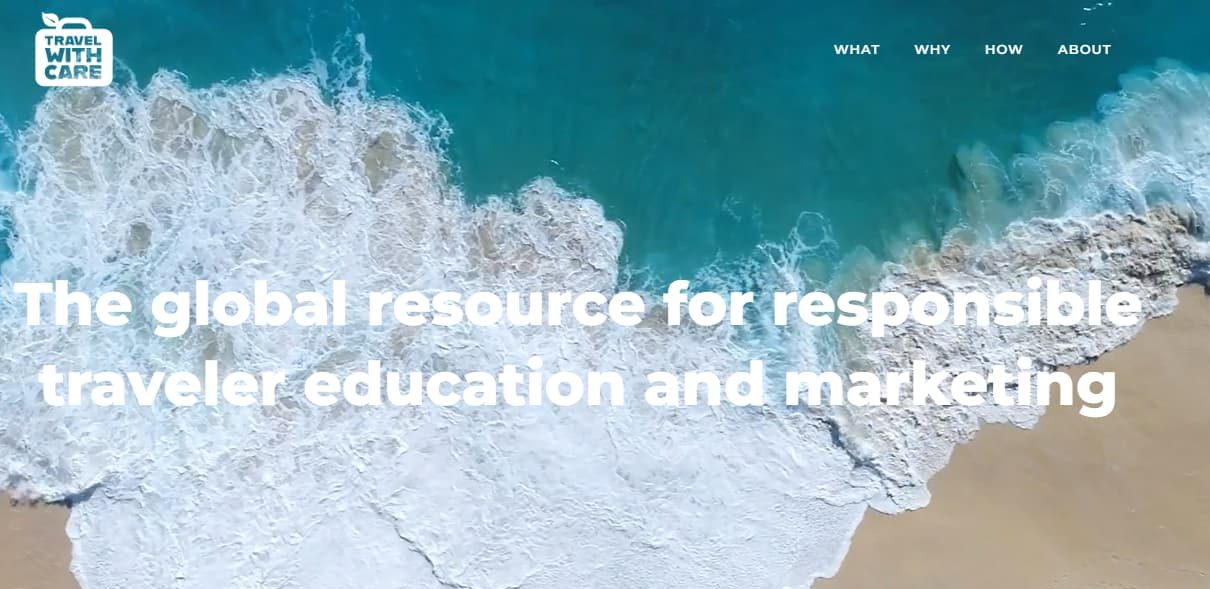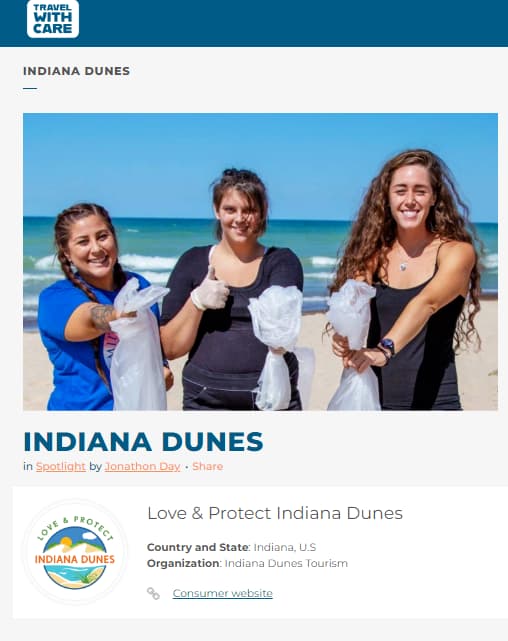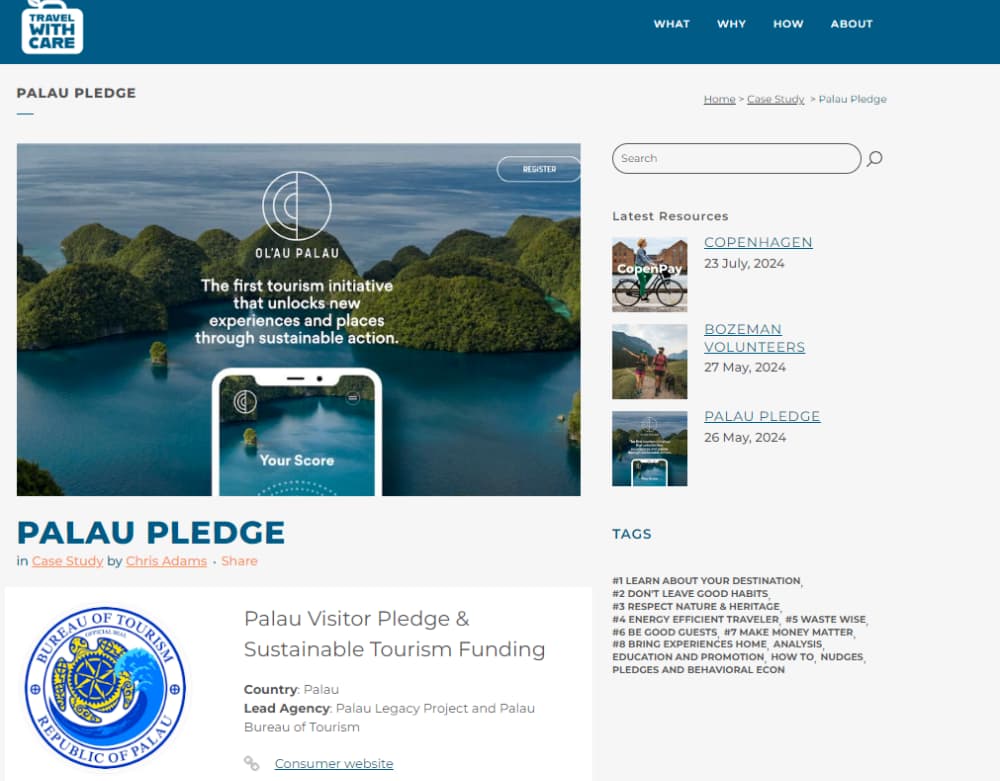Destination Stewardship Report – Volume 5, Issue 1
This post is from the Destination Stewardship Report, a publication that provides practical information and insights useful to anyone whose work or interests involve improving destination stewardship in a post-pandemic world.

The landing page for Travel with Care
Engaging Travelers in Destination Stewardship
The stream of tourists who visit a destination become part of that destination. What they say, what they do, how they spend, how they behave – as guests or invaders? – makes a difference. Increasingly, destination organizations want to brief their visitors on doing no harm, even doing some good. Purdue’s Dr. Jonathon Day explains how the Travel with Care initiative aims to help DMOs accustomed to marketing the place learn how to market good behavior.
How can destinations help clueless visitors become thoughtful guests?

Programs such as Indiana Dunes, provide visitors with an opportunity to give back to the community through volunteering and education. [Photo courtesy of Travel with Care]
The Sustainable Tourism and Responsible Travel Lab, together with Miles Partnership, has launched a new program – Travel with Care — designed to support destinations working to encourage better travel behaviors. The program brings together current research, examples of what is working, and tools that can be easily adopted to create a comprehensive resource for destinations and tourism organizations looking to encourage responsible travel. Our platform spotlights what is working in destinations around the world – from Palau to Wyoming, Quebec to Jordan. We also have the latest research from academics and the industry on improving traveler behavior.
Encouraging responsible travel has never been more important. Destinations seeking to improve the quality of life in their communities must engage travelers as partners to ensure tourism has a positive impact. The Travel with Care resources are designed to support destinations in making this happen.
Reasons to support responsible travel programs
Destinations should be encouraging responsible travel for three key reasons.
1. Travelers need – and want – help to travel responsibly.
Travelers want to travel more sustainably, but they need local help.
Two recent studies emphasize the important role DMOs and tourism businesses play in encouraging responsible travel. The 2023 Booking.com Sustainable Travel Report found that two-thirds (66%) of people want to leave the destination better than when they arrived, but 40% don’t know how to find activities that ensure they are giving back to the community.
The Expedia Group’s 2022 Sustainable Travel Report found that 7 in 10 consumers feel overwhelmed by starting the process of being a more sustainable traveler. The respondents to this study are looking for sustainable travel information from trusted travel resources. 50% of respondents would like to see more information on how to be a more sustainable traveler from local destination, tourism, or visitor resource groups.
2. Destination communities want tourists to behave better
Destination communities are demanding that visitors behave better. As visitor numbers increase, communities are more aware of the negative impacts of travelers. As a result, in some communities there is a growing chorus of calls for travelers to behave better when they visit – or stay away if they can’t be more responsible guests. Responsible traveler programs are a terrific way to show that the tourism industry is committed to ensuring the best outcomes from tourism and help visitors contribute positively to the places they visit.
3. Every traveler has an impact
Every traveler makes an impact. The tourism industry has been criticized for being too focused on the positives while overlooking the negative impacts of travelers and tourism. For a long time, our industry has taken credit for the positives but has taken no responsibility for the negatives of tourism. Responsible traveler programs recognize that if tourism is going to improve the quality of life in our communities, we must work to ensure that we maximize the benefits of tourism while minimizing and even eliminating the negatives.
How do we get better behavior?
It is not enough to say, “travelers should behave better.” Destinations must work to help travelers behave in ways that benefit the destination community.
Destinations are using a sophisticated set of tools to help travelers do the right thing. DMOs are important in promoting responsible travel behaviors from the people they encourage to visit. Some of the ways DMOs they can support responsible travel include:
- Education and Guidance: Destinations are creating innovative and exciting campaigns that welcome visitors and help them be better guests. Some of these campaigns embrace destination branding and reflect the community’s care for their special places, while others encourage visitors to commit to traveling responsibly during their stay.
- Marketing Campaigns: Many marketing campaigns are designed to meet goals that will increase sustainability. Examples include Buy Local campaigns, seasonality campaigns, and signature experience campaigns, which often feature unique local suppliers.
- Capacity Building and Industry Development: Tourism is a “team sport.” When the whole destination is committed to responsible travel, visitors soon appreciate its importance. DMOs can help encourage responsible travel behaviors by providing tools, resources, and training for the destination’s tourism products.
- Destination Development: DMOs can influence town planners and government to incorporate best practices (e.g., behavioral economics, placemaking techniques) in the design of public spaces and attractions to encourage responsible travel behaviors.
Of these approaches, promotion and education of travelers is the most common method of encouraging better behaviors. The Travel with Care team assessed the websites of more than two hundred destination marketing and management organizations (DMOs) across North America, Europe, and a selection of other countries to determine which had responsible traveler education and marketing efforts. We looked for all types of content designed to help visitors travel more responsibly. Our analysis of 208 DMOs highlighted that, as of May 2024:
- 33% have robust responsible traveler education and marketing content, including visitor codes, significant online content, and video and multimedia assets.
- A further 22% of DMOs have limited responsible traveler content, including simple online articles, blogs, or social media posts.

Palau is the first country to require visitors to sign a passport pledge committing to ecologically and culturally responsible behavior to protect the environment for future generations. [Photo courtesy of Travel with Care]
Building a community committed to encouraging responsible travel
The Travel with Care initiative is committed to creating a community of practice committed to supporting destinations that are encouraging responsible travel behaviors. The Travel with Care site provides examples of best practices currently in the marketplace. Travel with Care is also committed to bridging the gap between academic research and real-world practitioners. The site features easily digestible research insights from leading academic researchers as well as highlights of industry-based research. It is important that we – the tourism industry – learn from each other and grow together as stewards of our communities.
Website: www.travelwithcare.org
LinkedIn: Travel With Care Tourism Industry Group
About the Author
This story was submitted by Purdue University’s Sustainable Tourism & Responsible Travel Lab.



